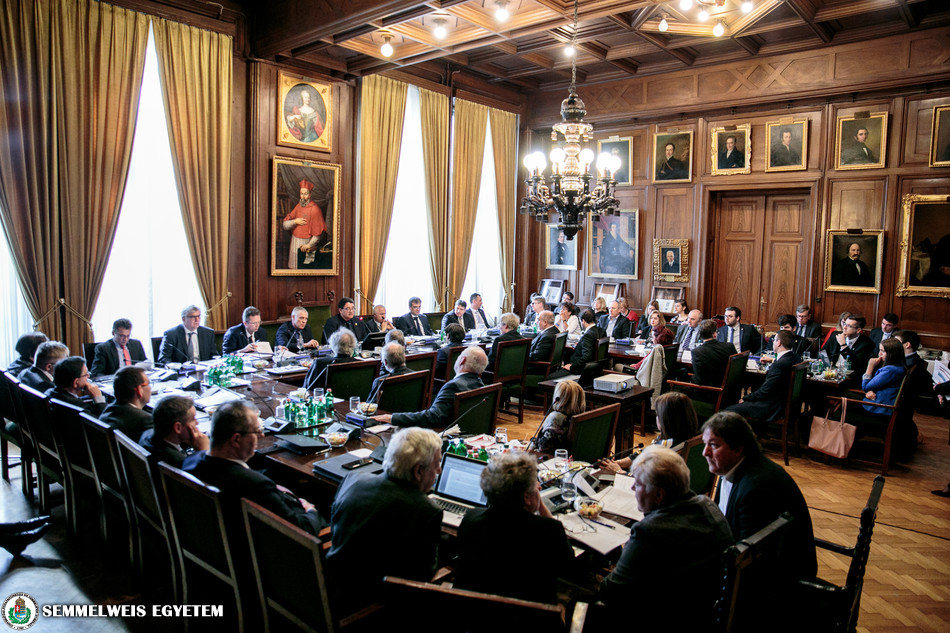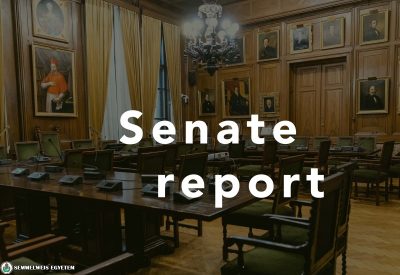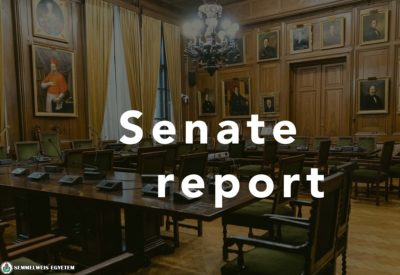The university’s Senate accepted at its March meeting the report on the financial accounts for 2018, as well as the executive budget for 2019. In additional to various personnel issues, it decided among others on the organization of this year’s Semmelweis Symposium, as well as on establishing a Neonatology Departmental Group within the 1st Department of Pediatrics. Rector Dr. Béla Merkely informed the body that the founder’s rights of the Lajos Markusovszky Foundation, which publishes the Orvosi Hetilap (Medical Weekly), will be transferred to the university.
 The cornerstone figures of the report on the financial accounts for 2018 were presented by Director General of Finance Irén Holló Baumgartnerné. The overall total amount of the budget for 2018 was originally HUF 93.6 billion, which due to modifications during the year increased to HUF 130.2 billion. The modifications in the planned revenue and expenditure figures were the result of measures by the government, the controlling authority, and under the own discretion of the university. The director general mentioned, for example, the additional funding provided by the managing authority for expanding in vitro fertilization activities, as well as the funds received under the Excellence in Higher Education and Higher Education Restructuring Programs. The plans for 2018 were also modified by the HUF 22 billion residual amount left over from 2017, as well as a surplus in budget revenues. The total sum of budget expenditures was HUF 101 billion, which represented an increase of HUF 13 billion compared to 2017. Of this increase, HUF 7 billion was from payroll expenses, HUF 4.8 billion from material expenses and HUF 1.2 billion from increased investments. The total budget revenues of the university came to HUF 125.5 billion in 2018, up HUF 15.4 billion from the preceding year.
The cornerstone figures of the report on the financial accounts for 2018 were presented by Director General of Finance Irén Holló Baumgartnerné. The overall total amount of the budget for 2018 was originally HUF 93.6 billion, which due to modifications during the year increased to HUF 130.2 billion. The modifications in the planned revenue and expenditure figures were the result of measures by the government, the controlling authority, and under the own discretion of the university. The director general mentioned, for example, the additional funding provided by the managing authority for expanding in vitro fertilization activities, as well as the funds received under the Excellence in Higher Education and Higher Education Restructuring Programs. The plans for 2018 were also modified by the HUF 22 billion residual amount left over from 2017, as well as a surplus in budget revenues. The total sum of budget expenditures was HUF 101 billion, which represented an increase of HUF 13 billion compared to 2017. Of this increase, HUF 7 billion was from payroll expenses, HUF 4.8 billion from material expenses and HUF 1.2 billion from increased investments. The total budget revenues of the university came to HUF 125.5 billion in 2018, up HUF 15.4 billion from the preceding year.
According to the submitted proposal, Semmelweis University closed a successful year from a financial standpoint. The Senate accepted the report, which earlier also received the preliminary approval of the Consistory. Furthermore, based on a verbal proposal at the meeting, a decision was also made that the internal rules on the passage of the budget should include the method of consultations with the Employee Council and other interest representation bodies.
Also on the agenda was the executive budget for 2019, which the body also accepted with the preliminary approval of the Consistory. Chancellor Dr. Károly Szász, presenting the proposal, said that the budget was prepared as a result of good collaborative work, with the cooperation of the commissioners appointed by the rector and the chancellor, and that it calculates with total revenues of HUF 105.3 billion – including the HUF 2.45 residual amount left over from 2018 – and total expenditures of HUF 107.5 billion. As detailed in the proposal, considering the primary importance of operations, HUF 2.25 billion in claims on top of the currently known revenues is included in the budget. This includes a HUF 250 million increase in the university’s development fund, which the Consistory initiated at its Monday meeting at the proposal of the rector, based on an agreement between the rector and the chancellor. The proposal submitted by the chancellor declares the intent to continue the human resources retention and development program that showed significant results in 2016–2018. The managing authority raised the planned total amount of funding provided from HUF 93.7 billion in the previous year to HUF 98.4 billion, which also includes the HUF 5.1 billion in development funds expected on the basis of already passed government decrees.
The rector emphasized that in the 2019 budget, revenues from education will be apportioned with the use of a new, performance-based algorithm, with the goal being to recognize actual performances in education, improve the quality of education, and introduce an interest system on the level of organizational units. He also stressed that during the negotiations, they were able to find a solution to provide the sources for the HUF 1.5 billion university development package, which includes the above-mentioned HUF 250 million increase in the development fund.
Participants approved the proposal on the professional concept of the Health Industry-Biotechnology Science Park in Budapest, which recalls that the rectors of Semmelweis University, the Pázmány Péter Catholic University and the National University of Public Service have signed a declaration of intent to set up a Science and Innovation Science Park, which will operate across the fields of academia and industry, and within that, health industry and biotechnology. (You can read our article on the topic here.) The innovation ecosystem built around the three universities could also provide a home, among others, to market and income-creating translational studies.
The proposal on the organization of the 2019 Semmelweis Symposium was also accepted. This year’s symposium will be a key element of the event series organized on the occasion of the university’s 250th anniversary, and will be held on November 5–7. Its main organizers are rector Dr. Béla Merkely, vice-rector for science and innovation Dr. Péter Ferdinandy and Dr. Miklós Kellermayer, the dean-elect of the Faculty of Medicine, and its topic will be “Translational medicine from single molecules to the cardiovascular system.”
The Senate also ranked several ongoing applications for executive positions, and decided on the recipients of several awards, such as those for gold signet rings, Pro Universitate awards, and the title of Semmelweis University Excellent Educator.
Senators supported the creation of a Digital Dentistry Technologist program within the Faculty of Dentistry, filling a gap that is present today in Hungarian higher education.
Pursuant to a decision by the Senate, a Neonatology Departmental Group will be established within the 1st Department of Pediatrics.
The Senate accepted the reports of the faculty commissions, and also decided on filling the vacant seats in the Appeals Board and other faculty commissions.
The body supported the decision that the rector, representing the university, should accept the transfer of the founder’s rights of the Lajos Markusovszky Foundation. The foundation’s scientific journal is the 160-year-old Orvosi Hetilap [Medical Weekly], which is the Hungarian-language scientific publication with the highest impact factor. The objective of the foundation, as stipulated in its founding charter, is to ensure the editing and publishing of Orvosi Hetilap.
The Senate’s secretary-general informed the Senate about the schedule of the Senate election and the state of the preparations. Further detailed information about the election will be provided on a website created for this purpose. (Read our earlier article, in Hungarian, about the schedule for the Senate election here).
Pálma Dobozi
Translation: Tamás Deme
Photo: Attila Kovács – Semmelweis University


